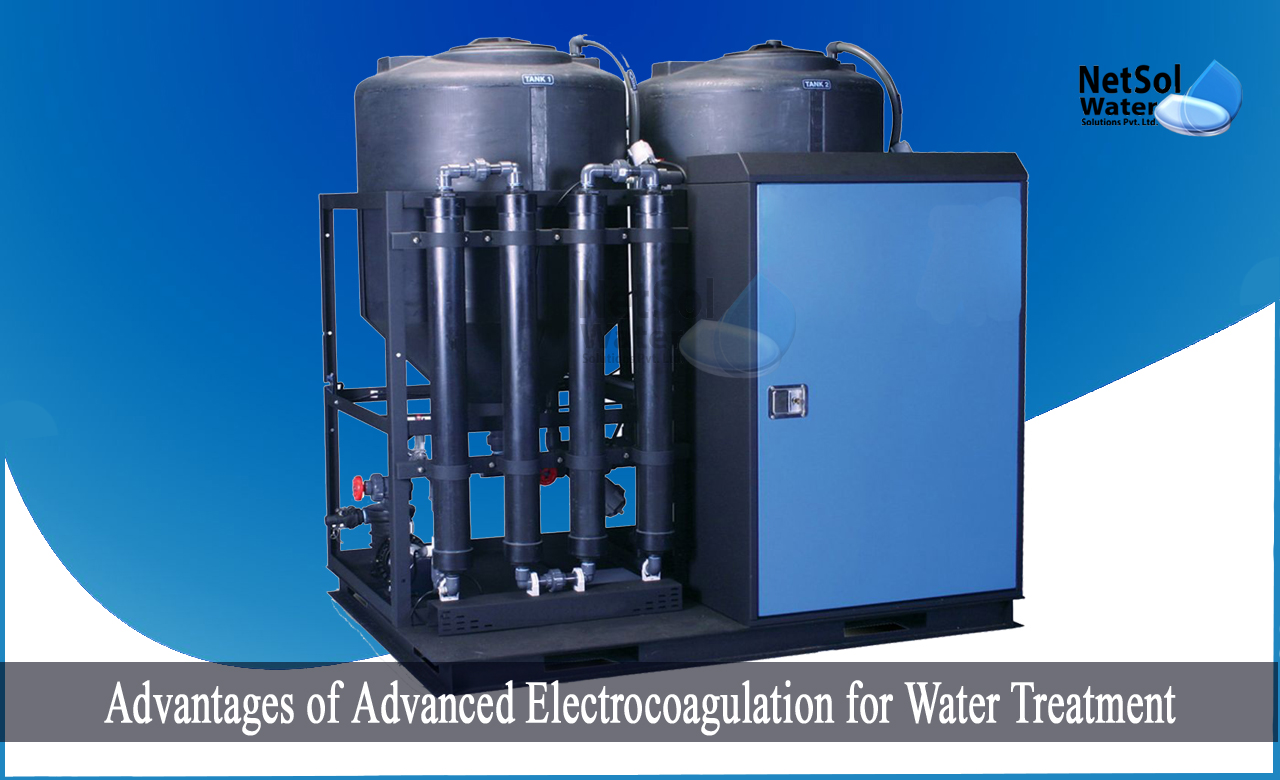What are the advantages of Advanced EC for Water Treatment?
Coagulation occurs in the course of treating water and wastewater. This method is frequently applied before filtration or sedimentation. Due to their similar charges repelling one another, the particles in the solution have a hard time settling. The charges of the particles must be neutralized, in order for the colloids to adhere to one another and precipitate, which will counteract the repellent forces. This is the optimal situation for post-treatment sedimentation and filtration.
One of two techniques—chemical coagulation or electrocoagulation water treatment—can be employed to cause coagulation. In the past, chemical coagulation has been widely employed. In many fields, electrocoagulation (EC) has lately gained recognition, for its efficacy as a treatment.
Advantages of advanced Electrocoagulation for water treatment
The benefits of advanced electrocoagulation water treatment are listed below.
· It can handle several pollutants in a single run
At the beginning of the treatment process, treatment water frequently contains a variety of pollutants. Among other things, there are colloidal solids, heavy metals, organic chemicals, and pesticides. To remove these many pollutants, some treatment techniques employ numerous systems. However, EC can sometimes just require one pass to remove them from a single system.
· Low generation of sludge
EC generates very less harmful sludge. The only part of EC that requires the addition of chemicals is the pH adjustment, so the volume of any created sludge doesn't need to be increased much.
Additionally, even if the majority of the electrodes serve as sacrifices, their rate of oxidation is not high enough, to significantly increase the sludge.On the less dangerous side of the sludge equation, the metals are in an oxide form and the pH balancing chemicals don't produce any potentially dangerous particles. In comparison to the riskier hydroxide form created during chemical coagulation operations, this form is better.
When EC systems are not corrected with an acid or base, their pH naturally veers towards neutral. As a result, the pH of the sludge is normally between 6 and 8, at the end of the operation.
Therefore, the sludge can be safely transported, dewatered, and disposed of due to its low volume and toxicity. In certain instances, it can also be utilized as a soil enhancer on agricultural land.
· Low cost of upkeep
Given how efficient EC treatment is, one may anticipate that it would necessitate a complicated and pricey set-up. Actually, using the system is fairly simple. It primarily comprises of a tank, to which a number of metal plates or media are attached. These electrodes are wired to a power source, which serves as both the cathode and the anode.
The process starts when the raw water and pH adjustment solution are added to the tank reactor, and power is applied to the electrodes. The system is not readily destroyed, because it does not require any mechanically moving elements. The plates only need to be cleaned sometimes with diluted acid, and replaced with new ones after a while for maintenance purposes.
This procedure is reasonably affordable to complete. Few workers are needed to operate, monitor, or maintain this system because it is simple to use, allowing for remote monitoring.
· Lower TDS wastewater is produced
When compared to a traditional chemical coagulation process, EC sometimes has the potential to handle raw water, and lower levels of total dissolved solids. This low concentration is a result of the absence of significant amounts of chemical additives.
Additionally, membrane fouling can be significantly decreased, by eliminating even some of the tiniest grains. As a result, operating expenses in these applications may be reduced, as the membranes don't need to be changed as frequently, as they would otherwise.
· Systems can rapidly adapt to changes in water quality
As the quality of the water changes, chemical coagulation makes it very challenging, to modify the process. However, only a few basic adjustments would need to be made, because the electrocoagulation device is extremely simple to use. These adjustments could be made to the system voltage, reaction duration, or solution pH. Even, while the treatment is already underway, this is a simple process.
How can we assist?
In recent years, the water treatment industry has become more and more interestedin the novel solution, known as electrocoagulation. Netsol Water has created a customized electrocoagulation system, which offers all the benefits listed, and many more, to our clients and partners.
The system is adaptable and can be used in a variety of industries. Process water, wastewater, drinking water, among other services,all can be treated by electrocoagulation.
Netsol Water is Greater Noida-based leading water & wastewater treatment plant manufacturer. We are industry's most demanding company based on client review and work quality. We are known as best commercial RO plant manufacturers, industrial RO plant manufacturer, sewage treatment plant manufacturer, Water Softener Plant Manufacturers and effluent treatment plant manufacturers. Apart from this 24x7 customer support is our USP. Call on +91-9650608473, or write us at enquiry@netsolwater.com for any support, inquiry or product-purchase related query.



